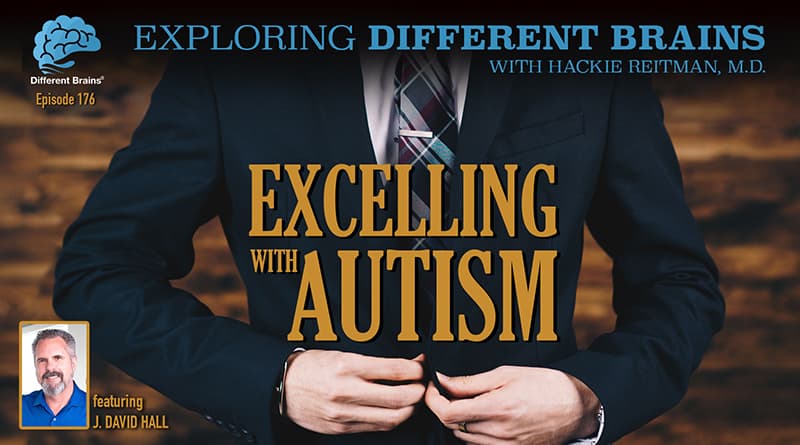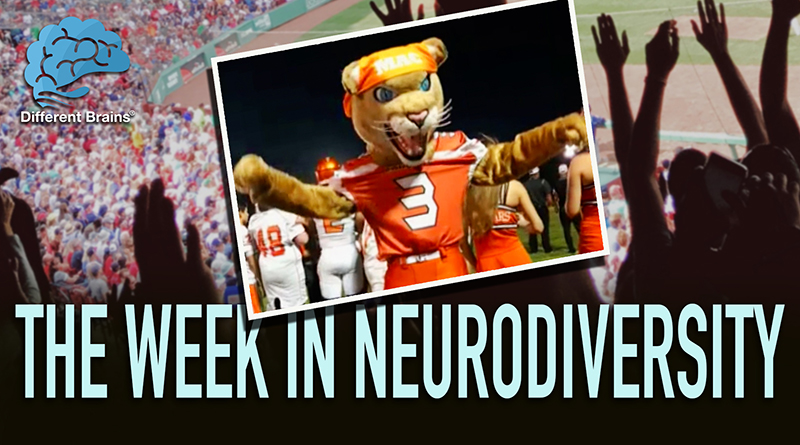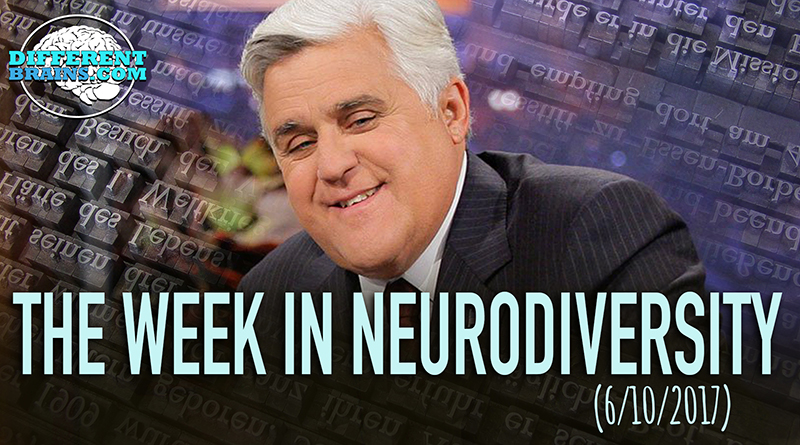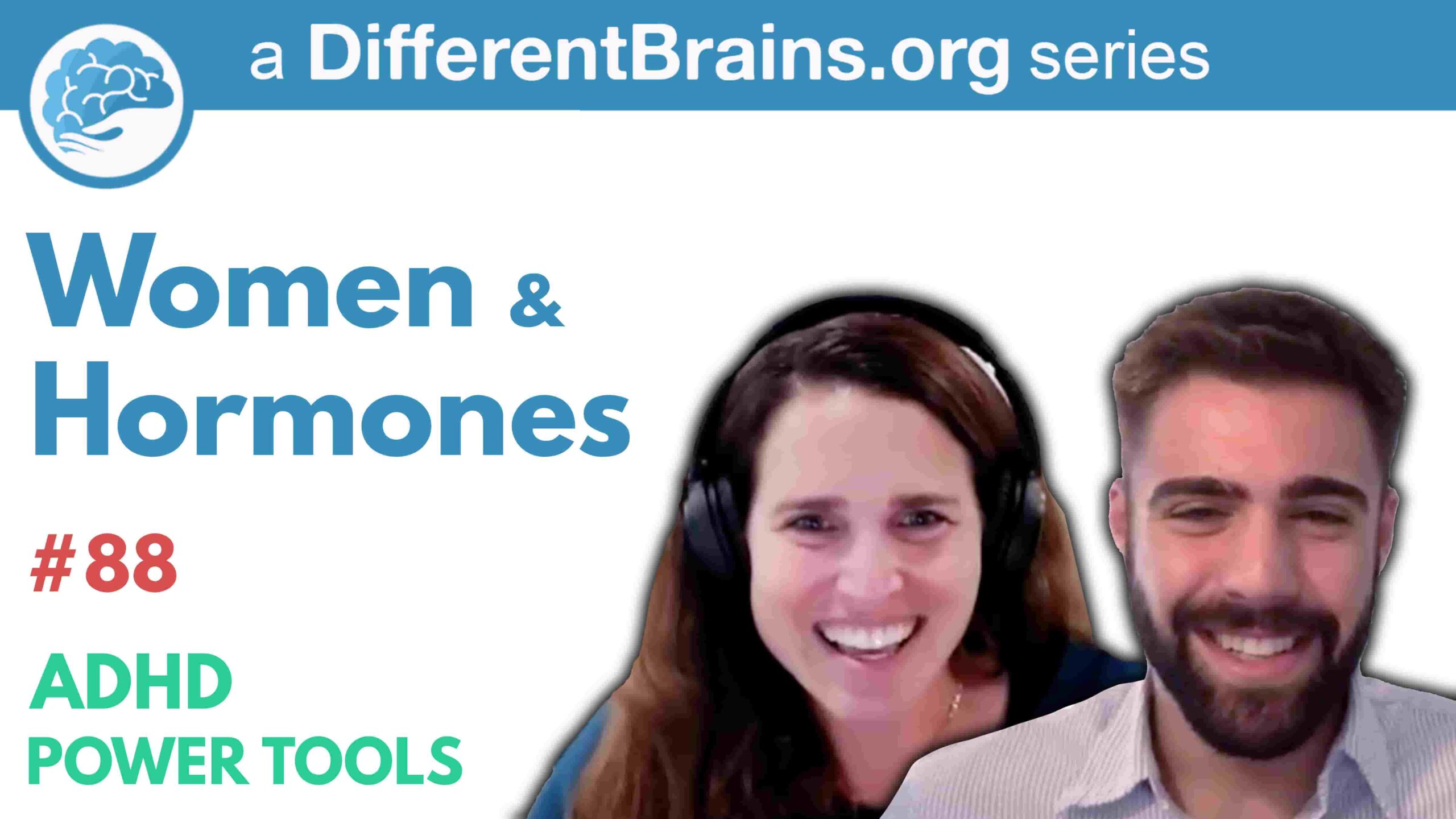
Excelling With Autism, featuring J David Hall of NeuroGuides | EDB 176
In this episode: we continue our chat with autism self-advocate and NeuroGuides CEO & founder J. David Hall.
(25 mins) David has three children: Asher, Cherith, and Levi, all living with ASD. After becoming heavily involved in autism advocacy, David himself learned he was also on the spectrum. He is the founder and CEO of NeuroGuides, a 501 (c) (3) non-profit organization that provides consultations and life coaching for autistic people, and educates businesses on inclusion. David discusses the common myths society has about people with autism, the importance of harnessing interests, and how individuals on the spectrum can excel at what they love doing.
For more about David and NeuroGuides, visit: NeuroGuides.org
For the first part of our interview, click here!
AUDIO PODCAST VERSION:
Or look for us on your favorite podcast provider:
iTunes | Stitcher | SoundCloud
FULL TRANSCRIPTION
J David Hall: Maximizing the Potential of Autistics
HACKIE REITMAN, M.D. (HR): Hi, I’m Dr. Hackie Reitman, welcome to another episode of exploring different brains, today we’re so lucky to have returning to us, David Hall, the CEO and founder of neuro guides, where they do so much for so many, David, welcome back to Exploring Different Brains!
J DAVID HALL (JDH): Thank you, Hackie! I definitely appreciate being here, and I’m very encouraged to be -to be joining you and good productive, positive work we do for autistic adults worldwide.
Neurodiverse relationships
HR: You’re married with three children, correct?
JDH: Yes.
HR: Is your wife neurodivergent?
JDH: No she is not. That’s a very interesting question, because you know, for- if you look at my earlier writings and articles, you’ll see bits and pieces of my belief that that is indeed the situation, that you know, my spouse is neurodivergent and my kids are all autistic and I- I believed that. This is why -this is why I speak to the power of Masky and to the power of not knowing what to say to thine self be true of knowing and believing that we’re something we’re not. This journey that I’m on as an autistic man now, has exploded and I mean that a positive sense- my own understanding of my self, the way that my mind operates and also has enabled me to see the differences of way other minds operate. So I’m no longer sort of creating a prefab, cookie cutter format to play on- place on top of other thinking. I am now free from that, and I see an entirely new landscape, so I can honor my spouse for thinking away she does and my children for thinking the way they do in honor myself now, and together, all of us are unique.
Myths about autism
HR: Pretty cool! I’m gonna have to think about that one, that was good! David, what is the biggest myth you think society has about autism spectrum?
JDH: Well, you know if you look back at the history of the word for autism, the original pioneers, the diagnosticians, the people of the researchers, who studied this thing we call autism, you know we’re fairly recent with this, Hackie, I mean you know that even 30 to 40 years ago, this was almost unknown- I mean known by a very few people, but it wasn’t until, you know, until Dustin Hoffman stepped onto the big screen with ‘Rain Man’ and began to talk about this thing- this thing called autism, and so what happened is that it jumped onto the cultural stage and it jumped onto the stage in a very strange way. Because Dustin Hoffman played- let’s give him credit for playing an autistic person, and he studied the role, and Steve Silverman knows him and- he did a good job playing for what he did, but also he communicated a picture, an image of an autistic person, that the culture picked up and ran with. So your question is what -what is the one thing that’s just -that we just get wrong as a culture? And I would say it would be making assumptions that all autistic persons are the same, and that- that they don’t each have unique attributes, this is a huge problem, it affects everything we do in the in the job market, educationally, it affects everything -it’s pervasive. If we can change one thing, if – and I- this is something I labor to do- if I could change one thing, it would be to show and to showcase and demonstrate that autistic persons, that it is a very big spectrum, and autistic persons are all each one unique– unique right? That’s the word, unique.
Highlighting an individual’s gifts
HR: You know, my journey into that was quite by accident. I had completed making the movie ‘the square root of 2’ starring Darby Stanchfield from ‘Scandal’, and after I made the movie, and my daughter Rebecca had graduated from college, she went to tutor kids in a place called Cumberland Academy of Georgia for autistic individuals, and I said to her “what do you want to tutor? Why don’t you wanna teach, get a real career?” she goes, “Dad you don’t get it, every brain is different they’re like snowflakes”, and we went to the school for the interview, and the- the woman along the school met my daughter for 10 minutes and said, “well doc, you know your daughter is also on the spectrum.” I said, “Wait a minute, I know she’s got a twenty-three brain tumors and epilepsy and everything, and we had her neuropsychologically tested and she had ADHD and some memory deficits, but- and she had two major brain surgeries- what’s autism?” She said “Well, it’s- she has aspergers and it’s on the spectrum”, and I go “What are you talking about?”
Me being a brilliant M.D. received no training in this, and so I held up her release of the movie and I’ve researched for a couple of years to find out what this was, and then when I had my aha moment, that’s when I wrote Aspertools, and then we made the documentary, where I pulled down all these scenes from this clueless father in the movie, a fictionalized version, and the distributor wanted me to -well, you’re going to have to make it more autistic, and you’re going to have to explain ‘cause Aspergers and autism isn’t mentioned in the whole movie, and I said “No! That’s the whole point.” You see Dustin Hoffman- this was much more accidentally nuanced because Darby Stanchfield, the actress, studied my daughter directly, had her stay at her home for a week, you know, and had it down perfect without Asperger’s or autism ever being mentioned, and so what we’re talking about is the public perception alright? What is it converted into? It converts into – if it’s a good one, it can convert into jobs, it could convert into school opportunities; But most importantly, I think it’s just one of the many kinds of different brains, what we have to say again, how can we maximize Michael’s potential?
JDH: Yes.
HR: To do whatever he’s going to do- come over here Michael and introduce yourself and tell ‘em how we met and everything. Look into that Green light there.
MICHAEL MORENO (MM): Hello. Well, when- when we first met for an interview with my parents along with me, I –
HR: No excuse me, when was the first time you saw me?
MM: Oh, first time, Oh!
HR: Sorry to interrupt.
MM: Sorry. We first met in McFatter Technical college, it was a career placement program class, and he visited to talk about Different Brains, and they were a non-profit organization, and so I kind of took it upon myself to listen to what he had to say in his presentation, and he even put up videos and a documentary as to what Different Brains was about, and so I was actually interested in the fact that of his organization and it kind of motivated me to, you know, figure out more about the organization online, and so my counselor actually said to me about an internship he was- he was possibly in needing, and so I said yes, and I went on in an interview with him along with my parents, and we talked about my qualifications and my skills, and here I am!
JDH: Michael may I have a question? I have a question for Michael. So Michael, when you begin to listen to him, what you -what you were seeing was someone who saw you- is that true? You were actually, all of a sudden, stepping out of this- of this- you probably since you were suddenly with this person who is seeking out to know you and know unique minds, and know neurodivergent persons- since you were suddenly without a cover or place to hide and you don’t even care, because you get to be seen and you know in your heart that so many people like you are not seen, they’re not valued, they’re not known, and there’s no vehicle for them to be known, and so when you see that happen, you jump on it, right?
MM: right, yeah, exactly, I just jump on it without hesitation, because I’m particularly different from what most of the normal people I should say, I’m more motivated, I’m more into what I want to do in my future
JDH: Yes.
MM: What my skills might be in one- and how I evolved, and wanting to become independent more of my goal- personal goal in reach.
No such thing as independent living
JDH: Let me speak to something, what we also do is say independent living, independent living, we all want independent living. Let me tell you there’s no such thing as independent living. I’ll say that again, there’s no such thing as independent living. I joke with people when I speak, I say “look, you want to see an independent living person go up to the border near Canada, go into a- a camp where there’s a hunter who lives there and hunts Moose or Grizzly or something, I said “you go find that person, you probably have found someone who is independent.” They don’t need anybody. They just do -if they want to eat, they go into the woods whatever they do, they’re independent.
We, and especially as neurodivergent persons, are created to be interdependent persons; interdependent. we need one another, we function best when our minds, when our purposes, our visions are connected; that’s who we are, you know, on a personal level, you know, I’m not independent- I do my-my hunting and my game gathering at the local grocery store. I- when I go down the street, I talk to other people; I depend on them for a lot of things, and they depend on me. We are created in being a community, and that in particular is where neurodivergent autistic persons on the spectrum are strongest, and I’m gonna say one more thing too- I am happy that Microsoft- yes I said your name Microsoft, you can do your algorithm thing- Apple and all of you, I am excited that you have all these programs, but you have to understand something, and by the way I’m hoping and I’ll say this right now on camera- I’m hoping that they call me and get me in there to do workshops on neurodiversity, ‘cause I would love to teach them to have neurodiverse cultures -workplace cultures so that they can help they’re already there, autistic staff people and employees, and those who are to come, but we have got to stop doing this, and I’m speaking to all these groups: Microsoft and everybody else; we’ve got to stop compartmentalizing autistic persons as the finest computer programmers and coders that you could ever hope for. okay? That is hogwash.
Fine, there are some autistic persons you want to be computer coders and programmers I’m going to help him do that, but there are many people out there who want to be cooks, who want to be- they want to be mechanics, they want to work on things; they want to be engineers, they want to be poets, like our friend Samantha Craft, right? Incredible poet. There are people who just need to be known for their own skills, their own unique designs, and we do them discredit, and we do them disservice when we don’t honor that. I spoke to a mom of a couple years ago- she says, “Well my daughter’s not going to be able to do anything. She’s 19 years old she’s autistic you know, we tried to get her job training here and there, and every time I hang on these words- every time we turn around and take our eyes off her, she snuck off; You know where she goes? I asked, “Where does she go?” She goes out to the garden, and she digs up all these plants and she plants new plants; She gets dirt and fertilizer and she’s puttin’ mulch, and she wants to go to the store and get these gardening materials and everything, and I said “Is it possible that you have a gardener on your hands, someone who loves plants, who loves growing things that loves life- what if you equipped her to be an incredibly gifted gardener and to enjoy her life for her particular unique skill-set”, and the mom thought, “you’re right! She’s happy in the garden!” Then help her define the garden.
HR: See, that
MM: Yep- absolutely
HR: Find what you want.
JDH: Yes.
HR: Back to your audio work! I hope the audio came out good when you-
MM: No, no, no, no, the audio’s good.
HR: Say goodbye.
MM: Oh, goodbye.
Autism and hyper-interests
HR: You know, whenever we have honored guests in the office, which is frequent, we- everybody we have to go around the room and everybody’s got to introduce themselves, and I always learn something new about everybody, especially the guests, the analogy I make that you just made so better than I could about the gardener, is you know, these – I I used to be the kid who wants to play with dinosaurs. All he wants to do is play with dinosaurs, dinosaurs, dinosaurs! Good! He can learn to make his living out of that. You know? I-
JDH: Yes, and Hackie when I work with- work with folks, what I find is there are hyper focus areas. So I value each of my focus area whatever it is-
HR: By the way, let me interrupt you to say the chapter in Aspertools, I call it ‘hyper interests’, because I don’t want to call it obsessions, you call it hyper-focus is perfect.
JDH: Hyper interest is great too, so I always look for several; I might -my assessment of a new person that I’ve gained to work with is again strength-based, I’m doing observational assessment, I’m look- I’m asking lots of questions that are going to be well-received by autistic persons. So I’m looking for what are their- what are their- you know, what are their passions, what are they doing? And let’s say I have two of those. You mentioned collecting dinosaurs- playing with Dinosaurs- I remember one autistic person who collected Matchbox cars. You know the little Matchbox cars? Well, and they knew- they had hundreds of these things, they knew everything about them- what kind of car they were, when this one was made, all that- so Matchbox cars. But they also had an interest in- I believe it was building things, mechanical, engineering things like that.
So what I say to them, is it maybe- now, unless you’re going to be the curator or the collections administrator for the Matchbox cars Museum in Kentucky, or wherever, then you may get a job; but you might not get a job based on the fact that you collect Matchbox cars. Maybe something you enjoy your whole life. My great-uncle Wesley, which is it another story we’ll save for another time, he loved to work math problems, crossword puzzles, his whole life he did that. But what no one knows is my great uncle Leslie served Out World War II in a place called Bletchley Park, in England, as a code breaker. He used his autistic mind to win World War II, so that is possible to have interest that are not going to be occupationally grounded. Let’s help people appreciate those hyper interest areas, and to flourish then they enjoy them as a gift. Yet let’s dig deeper and find something that they can use that’s going to have applicability in today’s workplace, that we can help them to do that. So that they can – they can have value in the work of their hands. They can make a living for themselves, they can feel good about themselves, and Hackie, you know when you see someone employed, and take joy in the fact that they belong, they have a workplace that accepts and they can make money for themselves and their families. It changes everything, doesn’t it?
HR: Self esteem is number one!
JDH: Absolutely.
How NeuroGuides helps
HR: David, this has been great, and I could talk to you for hours and I don’t want to keep you though. Tell me, what areas did we not discuss today that you’d really like to talk about now and get the word out?
JDH: Yeah, I think a lot of people ask me- so they- I think even if they’re grabbed in the concept of what we do with LifeGuides for Autistic / Neuroguides, they still want to know process, like what do you do actually, what are some key components of what you do? so the first thing I tell them is “Well, everyone is unique.” I don’t cookie cutter anyone. Every single person is unique. But having said that, there is a methodology, there’s a process involved. My volunteers and they know I’ve trained them to do this, and my board members they know- it’s E-3. E-3 is equipping and equipping is based on strengths. Based on individual needs. What is it that someone needs to learn, a skill that they don’t have now, that they need to engage in something they’re not very good at doing, but what- how can we equip them with that life skills stuff so that they can do what’s needed to be able to move into interdependent living, right?
And as you know already, this is a massive invisible situation in the culture right now. There are untold numbers of autistic persons who are living at home. They’re growing old at home, and their parents are saying to me and two others, “we’re getting old and I can’t care for my son or daughter when I’m 75 or 80 years old.” I need to see them moving to interdependent living. So we’re equipping them for life skills. We’re searching for what they need, and we’re doing it all. I’ve done cooking, I’ve helped in so many ways , whatever it is: hygiene or job skills. So equipping. The second is engagement. Engagement is where I go out in my organization’s bridge-builders. We’re constantly looking for connectivity for this person. We are always searching for- not just job opportunities- social opportunities, relational opportunities. We’re always looking for ways that we can build bridges, and not stand on the bridge for them; build the bridge and help them get across. Sing praise as they go, be happy for them. Build a bridge, we engage. The third is, and you know we- we kind of roll our eyes when we say these words sometimes, but I think it is so valid in the culture today, and that is encouragement. Encouragement is so critically important to the work we do. Every person I’m with; whether it’s an autistic adult or if it’s a family member or caregiver, I am constantly encouraging them and finding ways to be positive, productive, and to tell them and remind them, that they matter, they’re unique, importantly valued in this world, and we will help them find their place. Because again, I won’t allow myself to lose anyone Hackie, I can’t- it’s not in my nature.
HR: We all need the pat on the back- all we all need it.
JDH: Yes we do.
HR: And that’s so well put. I noticed that you have a masters in Divinity, how did that fit in to the whole picture?
JDH: Well that’s a great question, Hackie. You know I believed that at one point it was my calling to pastor, to come alongside and meet the hearts and minds of people who were disconnected, depressed, anxietal, who were looking for life answers, and what happened is I discovered in a very unique way, that I am called to pastor. I’m called to be a pastor for autistic persons. I’m- that’s where I’m finding my- my calling.
David’s tips for the neurodivergent
HR: If you had to give a neuro- if you had to give a neurodivergent individual one tip, what would that be?
JDH: My one thing that I would tell them, is this- do not give up. Do not- do not stop. There are more people out there who will love you, know you, and appreciate you than you could possibly know. Do not ever quit in seeking to find them, they will be looking for you too.
HR: David, you’re married with three kids. Why don’t you give our autistic audience those of us who might be on the spectrum, some tips about relationships.
JDH: Yes, I believe that relationships– and by the way, this is with all persons, we all, wherever we are, neurotypical or neurodivergent ought to be doing these things. The very best thing we can do for building relationships, is- is in seeing one another with clear authentic eyes. Now that’s not as hard as it sounds; what it means is we need to let go of our presuppositions, our- all of our structure that tell us how to behave with one another in sort of these expectations, we need to drop ‘em. We need to begin to see each other as fully human persons. When we do that, all of us: autistic or not, when we see each other as fully- fully human persons, it will change everything dramatically in all relationships, and you know what? It makes living life a lot more fun.
HR: Well said. David Hall of Neuroguides, it’s been a pleasure to have you once again here at differentbrains.org, thank you very much. keep up the great work!
JDH: Thanks Hackie! I will.




